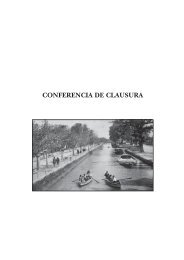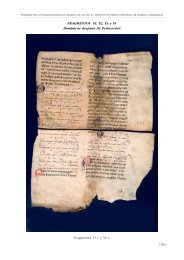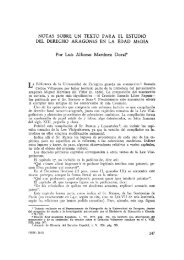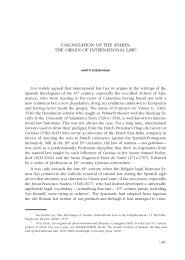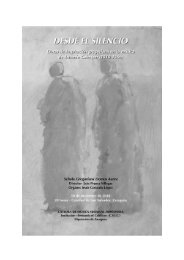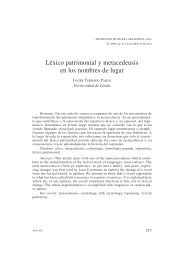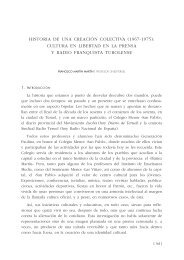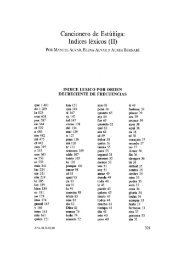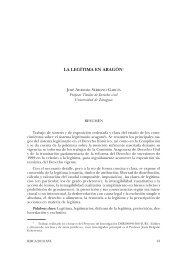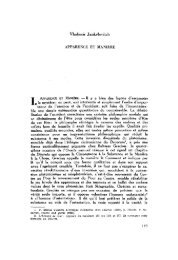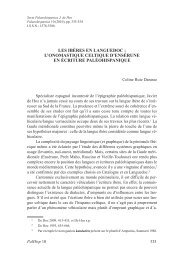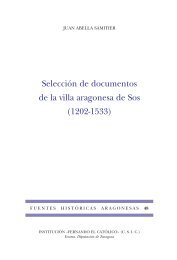- Page 1 and 2:
Rosa M.ª Ávila Ruiz, M.ª Pilar R
- Page 3:
Metodología de investigación en D
- Page 6 and 7:
Publicación número 2.950 de la In
- Page 8 and 9:
ROSA M.ª ÁVILA RUIZ correspondien
- Page 10 and 11:
ROSA M.ª ÁVILA RUIZ En el ámbito
- Page 12 and 13:
[ 10 ]
- Page 14 and 15:
[ 12 ]
- Page 16 and 17:
[ 14 ] KEITH C. BARTON ce desacerta
- Page 18 and 19:
KEITH C. BARTON hora de hablar de l
- Page 20 and 21:
KEITH C. BARTON nosotros tenemos la
- Page 22 and 23:
[ 20 ] KEITH C. BARTON y la liberta
- Page 24 and 25:
KEITH C. BARTON Nacionalistas o los
- Page 26 and 27:
KEITH C. BARTON tos de vista. Un gr
- Page 28 and 29:
KEITH C. BARTON en los diferentes m
- Page 30 and 31:
KEITH C. BARTON KITSON, A. (2007).
- Page 32 and 33:
Los programas [ 30 ] MARC-ANDRÉ É
- Page 34 and 35:
Los manuales MARC-ANDRÉ ÉTHIER Y
- Page 36 and 37:
MARC-ANDRÉ ÉTHIER Y DAVID LEFRAN
- Page 38 and 39:
[ 36 ] MARC-ANDRÉ ÉTHIER Y DAVID
- Page 40 and 41:
condiciones de vida difíciles de n
- Page 42 and 43:
MARC-ANDRÉ ÉTHIER Y DAVID LEFRAN
- Page 44 and 45:
MARC-ANDRÉ ÉTHIER Y DAVID LEFRAN
- Page 46 and 47:
MARC-ANDRÉ ÉTHIER Y DAVID LEFRAN
- Page 48 and 49:
[ 46 ]
- Page 50 and 51:
[ 48 ] NEUS SANMARTÍ bajo nivel en
- Page 52 and 53:
NEUS SANMARTÍ logía, especialment
- Page 54 and 55:
Un importante número de los trabaj
- Page 56 and 57:
[ 54 ]
- Page 58 and 59:
[ 56 ] SALVADOR LLINARES ha sido re
- Page 60 and 61:
SALVADOR LLINARES iii) Sobre la vis
- Page 62 and 63:
REFERENCIAS BIBLIOGRÁFICAS SALVADO
- Page 64 and 65:
[ 62 ] M.ª PILAR NÚÑEZ DELGADO e
- Page 66 and 67:
La DL -y como ella todas las didác
- Page 68 and 69:
M.ª PILAR NÚÑEZ DELGADO (Guillé
- Page 70 and 71:
M.ª PILAR NÚÑEZ DELGADO nociones
- Page 72 and 73:
valores culturales, presentados y j
- Page 74 and 75:
zadas y dar primacía a las prácti
- Page 76 and 77:
[ 74 ]
- Page 78 and 79:
[ 76 ] BEATRICE BORGHI Llevando al
- Page 80 and 81:
BEATRICE BORGHI al campo de la inda
- Page 82 and 83:
BEATRICE BORGHI bien a las investig
- Page 84 and 85:
[ 82 ] BEATRICE BORGHI La conexión
- Page 86 and 87:
BEATRICE BORGHI DONDARINI, R. (1999
- Page 88 and 89:
[ 86 ] NICOLÁS MARTÍNEZ VALCÁRCE
- Page 90 and 91:
NICOLÁS MARTÍNEZ VALCÁRCEL, ELIS
- Page 92 and 93:
NICOLÁS MARTÍNEZ VALCÁRCEL, ELIS
- Page 94 and 95:
[ 92 ] NICOLÁS MARTÍNEZ VALCÁRCE
- Page 96 and 97:
[ 94 ]
- Page 98 and 99:
Tabla 1 [ 96 ] IVO MATTOZZI Palabra
- Page 100 and 101:
IVO MATTOZZI La segunda idea errón
- Page 102 and 103:
explicativas originales y profundas
- Page 104:
IVO MATTOZZI • En conclusión, vu
- Page 107 and 108:
LA PRÁCTICA DE LA ENSEÑANZA DE LA
- Page 109 and 110:
LA PRÁCTICA DE LA ENSEÑANZA DE LA
- Page 111 and 112:
LA PRÁCTICA DE LA ENSEÑANZA DE LA
- Page 113 and 114:
LA PRÁCTICA DE LA ENSEÑANZA DE LA
- Page 115 and 116:
LA PRÁCTICA DE LA ENSEÑANZA DE LA
- Page 117 and 118:
UNA INVESTIGACIÓN SOBRE LA FORMACI
- Page 119 and 120:
UNA INVESTIGACIÓN SOBRE LA FORMACI
- Page 121 and 122:
UNA INVESTIGACIÓN SOBRE LA FORMACI
- Page 123 and 124:
UNA INVESTIGACIÓN SOBRE LA FORMACI
- Page 125 and 126:
UNA INVESTIGACIÓN SOBRE LA FORMACI
- Page 127 and 128:
par l’usage de méthodes de reche
- Page 129 and 130:
UNA INVESTIGACIÓN SOBRE LA FORMACI
- Page 131 and 132:
EL ESTUDIANTADO Y LA FORMACIÓN CIU
- Page 133 and 134:
EL ESTUDIANTADO Y LA FORMACIÓN CIU
- Page 135 and 136:
EL ESTUDIANTADO Y LA FORMACIÓN CIU
- Page 137 and 138:
EL ESTUDIANTADO Y LA FORMACIÓN CIU
- Page 139 and 140:
EL ESTUDIANTADO Y LA FORMACIÓN CIU
- Page 141 and 142:
INVESTIGACIÓN CUALITATIVA Y CUANTI
- Page 143 and 144:
INVESTIGACIÓN CUALITATIVA Y CUANTI
- Page 145 and 146:
para compararlo. Y del mismo modo q
- Page 147 and 148:
INVESTIGACIÓN CUALITATIVA Y CUANTI
- Page 149 and 150:
permiten evaluar los procesos de ap
- Page 151 and 152:
INTRODUCCIÓN LA METODOLOGÍA ETNOG
- Page 153 and 154:
LA METODOLOGÍA ETNOGRÁFICA. REFLE
- Page 155 and 156:
LA METODOLOGÍA ETNOGRÁFICA. REFLE
- Page 157 and 158:
LA METODOLOGÍA ETNOGRÁFICA. REFLE
- Page 159 and 160:
LA METODOLOGÍA ETNOGRÁFICA. REFLE
- Page 161 and 162:
DIDÁCTICA Y GEOGRAFÍA: LA INVESTI
- Page 163 and 164:
DIDÁCTICA Y GEOGRAFÍA: LA INVESTI
- Page 165 and 166:
DIDÁCTICA Y GEOGRAFÍA: LA INVESTI
- Page 167 and 168:
dimensión recurrente en las invest
- Page 169 and 170:
LA TRANSICIÓN ENTRE TEORÍA Y CAMP
- Page 171 and 172:
LA TRANSICIÓN ENTRE TEORÍA Y CAMP
- Page 173 and 174:
LA TRANSICIÓN ENTRE TEORÍA Y CAMP
- Page 175 and 176:
LA TRANSICIÓN ENTRE TEORÍA Y CAMP
- Page 177 and 178:
INTRODUCCIÓN LA PRÁCTICA DOCENTE
- Page 179 and 180:
LA PRÁCTICA DOCENTE EN LAS CIENCIA
- Page 181 and 182:
LA PRÁCTICA DOCENTE EN LAS CIENCIA
- Page 183 and 184:
LA PRÁCTICA DOCENTE EN LAS CIENCIA
- Page 185 and 186:
extraescolares. Además se aprecia
- Page 187 and 188:
PARTE II. INVESTIGACIÓN SOBRE CUES
- Page 189 and 190:
EL MÉTODO PARA EL ANÁLISIS DE LOS
- Page 191 and 192:
EL MÉTODO PARA EL ANÁLISIS DE LOS
- Page 193 and 194:
EL MÉTODO PARA EL ANÁLISIS DE LOS
- Page 195 and 196: EL MÉTODO PARA EL ANÁLISIS DE LOS
- Page 197 and 198: EL MÉTODO PARA EL ANÁLISIS DE LOS
- Page 199 and 200: EL MÉTODO PARA EL ANÁLISIS DE LOS
- Page 201 and 202: hemos privilegiado una segunda cate
- Page 203 and 204: EL MÉTODO PARA EL ANÁLISIS DE LOS
- Page 205 and 206: cambiar su sistema de enseñanza, h
- Page 207 and 208: EL MÉTODO PARA EL ANÁLISIS DE LOS
- Page 209 and 210: ESTUDIO DE LAS TRANSICIONES DICTADU
- Page 211 and 212: ESTUDIO DE LAS TRANSICIONES DICTADU
- Page 213 and 214: ESTUDIO DE LAS TRANSICIONES DICTADU
- Page 215 and 216: ESTUDIO DE LAS TRANSICIONES DICTADU
- Page 217 and 218: ESTUDIO DE LAS TRANSICIONES DICTADU
- Page 219 and 220: ESTUDIO DE LAS TRANSICIONES DICTADU
- Page 221 and 222: ESTUDIO DE LAS TRANSICIONES DICTADU
- Page 223 and 224: ESTUDIO DE LAS TRANSICIONES DICTADU
- Page 225 and 226: ELABORACIÓN DE UNA FICHA PARA EL A
- Page 227 and 228: ELABORACIÓN DE UNA FICHA PARA EL A
- Page 229 and 230: ELABORACIÓN DE UNA FICHA PARA EL A
- Page 231 and 232: ELABORACIÓN DE UNA FICHA PARA EL A
- Page 233 and 234: ELABORACIÓN DE UNA FICHA PARA EL A
- Page 235 and 236: ELABORACIÓN DE UNA FICHA PARA EL A
- Page 237 and 238: UNA INVESTIGACIÓN SOBRE ESPERANZAS
- Page 239 and 240: UNA INVESTIGACIÓN SOBRE ESPERANZAS
- Page 241 and 242: UNA INVESTIGACIÓN SOBRE ESPERANZAS
- Page 243 and 244: UNA INVESTIGACIÓN SOBRE ESPERANZAS
- Page 245: UNA INVESTIGACIÓN SOBRE ESPERANZAS
- Page 249 and 250: INTRODUCCIÓN INVESTIGAR LA PARTICI
- Page 251 and 252: INVESTIGAR LA PARTICIPACIÓN 4º.
- Page 253 and 254: aproximación que va de lo más gen
- Page 255 and 256: • Tipos de problemas contemplados
- Page 257 and 258: REFERENCIAS BIBLIOGRÁFICAS INVESTI
- Page 259 and 260: LA IMPORTANCIA DE LAS TENDENCIAS HI
- Page 261 and 262: LA IMPORTANCIA DE LAS TENDENCIAS HI
- Page 263 and 264: LA IMPORTANCIA DE LAS TENDENCIAS HI
- Page 265 and 266: METODOLOGÍA DE INVESTIGACIÓN PARA
- Page 267 and 268: METODOLOGÍA DE INVESTIGACIÓN PARA
- Page 269 and 270: METODOLOGÍA DE INVESTIGACIÓN PARA
- Page 271 and 272: METODOLOGÍA DE INVESTIGACIÓN PARA
- Page 273 and 274: METODOLOGÍA DE INVESTIGACIÓN PARA
- Page 275 and 276: CONCEPTOS Y VALORES CIUDADANOS DEL
- Page 277 and 278: CONCEPTOS Y VALORES CIUDADANOS DEL
- Page 279 and 280: CONCEPTOS Y VALORES CIUDADANOS DEL
- Page 281 and 282: CONCEPTOS Y VALORES CIUDADANOS DEL
- Page 283 and 284: CONCEPTOS Y VALORES CIUDADANOS DEL
- Page 285 and 286: LA INVESTIGACIÓN-ACCIÓN COLABORAT
- Page 287 and 288: LA INVESTIGACIÓN-ACCIÓN COLABORAT
- Page 289 and 290: LA INVESTIGACIÓN-ACCIÓN COLABORAT
- Page 291 and 292: LA INVESTIGACIÓN-ACCIÓN COLABORAT
- Page 293 and 294: LA INVESTIGACIÓN-ACCIÓN COLABORAT
- Page 295 and 296: EL PATRIMONIO EN EL ÁREA DE CONOCI
- Page 297 and 298:
EL PATRIMONIO EN EL ÁREA DE CONOCI
- Page 299 and 300:
EL PATRIMONIO EN EL ÁREA DE CONOCI
- Page 301 and 302:
de sólo importa la identificación
- Page 303 and 304:
Anexo I. EL PATRIMONIO EN EL ÁREA
- Page 305 and 306:
LA INVESTIGACIÓN SOBRE EL PENSAMIE
- Page 307 and 308:
LA INVESTIGACIÓN SOBRE EL PENSAMIE
- Page 309 and 310:
LA INVESTIGACIÓN SOBRE EL PENSAMIE
- Page 311 and 312:
LA INVESTIGACIÓN SOBRE EL PENSAMIE
- Page 313 and 314:
LA INVESTIGACIÓN SOBRE EL PENSAMIE
- Page 315 and 316:
UN INSTRUMENTO DE ANÁLISIS PARA LA
- Page 317 and 318:
UN INSTRUMENTO DE ANÁLISIS PARA LA
- Page 319 and 320:
UN INSTRUMENTO DE ANÁLISIS PARA LA
- Page 321 and 322:
UN INSTRUMENTO DE ANÁLISIS PARA LA
- Page 323 and 324:
UN INSTRUMENTO DE ANÁLISIS PARA LA
- Page 325 and 326:
UN INSTRUMENTO DE ANÁLISIS PARA LA
- Page 327 and 328:
UN INSTRUMENTO DE ANÁLISIS PARA LA
- Page 329 and 330:
A MODO DE JUSTIFICACIÓN LA MEMORIA
- Page 331 and 332:
LA MEMORIA HISTÓRICA EN EL AULA re
- Page 333 and 334:
LA MEMORIA HISTÓRICA EN EL AULA B)
- Page 335 and 336:
LA MEMORIA HISTÓRICA EN EL AULA en
- Page 337 and 338:
PARTE III. INVESTIGACIÓN Y FORMACI
- Page 339 and 340:
INVESTIGACIÓN SOBRE LA ENSEÑANZA
- Page 341 and 342:
INVESTIGACIÓN SOBRE LA ENSEÑANZA
- Page 343 and 344:
INVESTIGACIÓN SOBRE LA ENSEÑANZA
- Page 345 and 346:
INVESTIGACIÓN SOBRE LA ENSEÑANZA
- Page 347 and 348:
INVESTIGACIÓN SOBRE LA ENSEÑANZA
- Page 349 and 350:
INVESTIGACIÓN SOBRE LA ENSEÑANZA
- Page 351 and 352:
INVESTIGACIÓN SOBRE LA ENSEÑANZA
- Page 353 and 354:
INVESTIGACIÓN SOBRE LA ENSEÑANZA
- Page 355 and 356:
INVESTIGACIÓN SOBRE LA ENSEÑANZA
- Page 357:
INVESTIGACIÓN SOBRE LA ENSEÑANZA
- Page 360 and 361:
[ 358 ] ANTONI SANTISTEBAN FERNÁND
- Page 362 and 363:
ANTONI SANTISTEBAN FERNÁNDEZ la in
- Page 364 and 365:
ANTONI SANTISTEBAN FERNÁNDEZ c) y,
- Page 366 and 367:
[ 364 ] ANTONI SANTISTEBAN FERNÁND
- Page 368 and 369:
PARA ACABAR ANTONI SANTISTEBAN FERN
- Page 370 and 371:
ANTONI SANTISTEBAN FERNÁNDEZ SANTI
- Page 372 and 373:
[ 370 ] JOSÉ MARÍA CUENCA LÓPEZ
- Page 374 and 375:
JOSÉ MARÍA CUENCA LÓPEZ En estos
- Page 376 and 377:
JOSÉ MARÍA CUENCA LÓPEZ En funci
- Page 378 and 379:
[ 376 ] JOSÉ MARÍA CUENCA LÓPEZ
- Page 380 and 381:
como deficitarios en trabajos de re
- Page 383 and 384:
LA FORMACIÓN DE INVESTIGADORES EN
- Page 385 and 386:
LA FORMACIÓN DE INVESTIGADORES EN
- Page 387 and 388:
LA FORMACIÓN DE INVESTIGADORES EN
- Page 389 and 390:
LA FORMACIÓN DE INVESTIGADORES EN
- Page 391 and 392:
LA FORMACIÓN DE INVESTIGADORES EN
- Page 393 and 394:
REFLEXIONES Y CONSEJOS PARA UN APRE
- Page 395 and 396:
REFLEXIONES Y CONSEJOS PARA UN APRE
- Page 397 and 398:
las de conocimiento más o menos as
- Page 399 and 400:
número de tesis doctorales que van
- Page 401 and 402:
LA INVESTIGACIÓN EN DIDÁCTICA DE
- Page 403 and 404:
LA INVESTIGACIÓN EN DIDÁCTICA DE
- Page 405 and 406:
LA INVESTIGACIÓN EN DIDÁCTICA DE
- Page 407 and 408:
LA INVESTIGACIÓN EN DIDÁCTICA DE
- Page 409 and 410:
LA INVESTIGACIÓN EN DIDÁCTICA DE
- Page 411 and 412:
LA INVESTIGACIÓN EN DIDÁCTICA DE
- Page 413 and 414:
LA INVESTIGACIÓN EN DIDÁCTICA DE
- Page 415 and 416:
LA INVESTIGACIÓN EN DIDÁCTICA DE
- Page 417 and 418:
LA INVESTIGACIÓN EN DIDÁCTICA DE
- Page 419 and 420:
CUARENTA Y CINCO AÑOS DE EXPERIENC
- Page 421 and 422:
CUARENTA Y CINCO AÑOS DE EXPERIENC
- Page 423 and 424:
CUARENTA Y CINCO AÑOS DE EXPERIENC
- Page 425 and 426:
CUARENTA Y CINCO AÑOS DE EXPERIENC
- Page 427 and 428:
CUARENTA Y CINCO AÑOS DE EXPERIENC
- Page 429 and 430:
CUARENTA Y CINCO AÑOS DE EXPERIENC
- Page 431 and 432:
CUARENTA Y CINCO AÑOS DE EXPERIENC
- Page 433 and 434:
CUARENTA Y CINCO AÑOS DE EXPERIENC
- Page 435 and 436:
LA DIDÁCTICA DE LA HISTORIA Y SU P
- Page 437 and 438:
LA DIDÁCTICA DE LA HISTORIA Y SU P
- Page 439 and 440:
LA DIDÁCTICA DE LA HISTORIA Y SU P
- Page 441 and 442:
LA DIDÁCTICA DE LA HISTORIA Y SU P
- Page 443 and 444:
INTRODUCCIÓN LA INVESTIGACIÓN EN
- Page 445 and 446:
LA INVESTIGACIÓN EN FORMACIÓN INI
- Page 447 and 448:
Durante el primer año fue necesari
- Page 449 and 450:
LA INVESTIGACIÓN EN FORMACIÓN INI
- Page 451 and 452:
actividad educativa beneficiosa par
- Page 453 and 454:
EL NUEVO MÁSTER DE FORMACIÓN DEL
- Page 455 and 456:
EL NUEVO MÁSTER DE FORMACIÓN DEL
- Page 457 and 458:
EL NUEVO MÁSTER DE FORMACIÓN DEL
- Page 459 and 460:
EL MÁSTER DE SECUNDARIA, EN SU MOD
- Page 461 and 462:
EL MÁSTER DE SECUNDARIA, EN SU MOD
- Page 463 and 464:
EL MÁSTER DE SECUNDARIA, EN SU MOD
- Page 465 and 466:
EL MÁSTER DE SECUNDARIA, EN SU MOD
- Page 467 and 468:
EL MÁSTER DE SECUNDARIA, EN SU MOD
- Page 469 and 470:
LA INVESTIGACIÓN DEL PROFESOR DE S
- Page 471 and 472:
LA INVESTIGACIÓN DEL PROFESOR DE S
- Page 473 and 474:
LA INVESTIGACIÓN DEL PROFESOR DE S
- Page 475 and 476:
LA INVESTIGACIÓN DEL PROFESOR DE S
- Page 477 and 478:
LA INVESTIGACIÓN DEL PROFESOR DE S
- Page 479 and 480:
FORMACIÓN E INVESTIGACIÓN EN DID
- Page 481 and 482:
• Universidad Nacional de Cuyo.
- Page 483 and 484:
FORMACIÓN E INVESTIGACIÓN EN DID
- Page 485 and 486:
nua del profesorado en un área del
- Page 487 and 488:
INVESTIGACIÓN SOBRE PROFESORES DE
- Page 489 and 490:
INVESTIGACIÓN SOBRE PROFESORES DE
- Page 491 and 492:
INVESTIGACIÓN SOBRE PROFESORES DE
- Page 493 and 494:
INVESTIGACIÓN SOBRE PROFESORES DE
- Page 495 and 496:
INVESTIGACIÓN SOBRE PROFESORES DE
- Page 497 and 498:
UN PROYECTO PARA LA INVESTIGACIÓN,
- Page 499 and 500:
UN PROYECTO PARA LA INVESTIGACIÓN,
- Page 501 and 502:
UN PROYECTO PARA LA INVESTIGACIÓN,
- Page 503 and 504:
UN PROYECTO PARA LA INVESTIGACIÓN,
- Page 505 and 506:
UN PROYECTO PARA LA INVESTIGACIÓN,
- Page 507 and 508:
UN PROYECTO PARA LA INVESTIGACIÓN,
- Page 509 and 510:
LA EDUCACIÓN DE PERSONAS ADULTAS C
- Page 511 and 512:
LA EDUCACIÓN DE PERSONAS ADULTAS C
- Page 513 and 514:
LA EDUCACIÓN DE PERSONAS ADULTAS C
- Page 515 and 516:
LA EDUCACIÓN DE PERSONAS ADULTAS C
- Page 517 and 518:
UNA EXPERIENCIA DE INVESTIGACIÓN I
- Page 519 and 520:
UNA EXPERIENCIA DE INVESTIGACIÓN I
- Page 521 and 522:
UNA EXPERIENCIA DE INVESTIGACIÓN I
- Page 523 and 524:
UNA EXPERIENCIA DE INVESTIGACIÓN I
- Page 525 and 526:
UNA EXPERIENCIA DE INVESTIGACIÓN I
- Page 527 and 528:
LA RECREACIÓN HISTÓRICA EN EL PRO
- Page 529 and 530:
LA RECREACIÓN HISTÓRICA EN EL PRO
- Page 531 and 532:
LA RECREACIÓN HISTÓRICA EN EL PRO
- Page 533 and 534:
LA RECREACIÓN HISTÓRICA EN EL PRO
- Page 535:
LA RECREACIÓN HISTÓRICA EN EL PRO
- Page 538 and 539:
[ 536 ] JAVIER QUINTEROS CORTÉS de
- Page 540 and 541:
3- La formación del docente: punto
- Page 542 and 543:
JAVIER QUINTEROS CORTÉS LOSTE, M.
- Page 545 and 546:
DIALOGAR CON LAS PRÁCTICAS DE AULA
- Page 547 and 548:
ACERCA DE LA INVESTIGACIÓN DIALOGA
- Page 549 and 550:
DIALOGAR CON LAS PRÁCTICAS DE AULA
- Page 551 and 552:
DIALOGAR CON LAS PRÁCTICAS DE AULA
- Page 553:
DIALOGAR CON LAS PRÁCTICAS DE AULA
- Page 556 and 557:
[ 554 ] F. J. TRIGUEROS CANO, S. MO
- Page 558 and 559:
[ 556 ] F. J. TRIGUEROS CANO, S. MO
- Page 560 and 561:
2º CICLO 3º CICLO [ 558 ] F. J. T
- Page 562 and 563:
[ 560 ] F. J. TRIGUEROS CANO, S. MO
- Page 564 and 565:
F. J. TRIGUEROS CANO, S. MOLINA PUC
- Page 566 and 567:
F. J. TRIGUEROS CANO, S. MOLINA PUC
- Page 568 and 569:
[ 566 ]
- Page 570 and 571:
[ 568 ] CELIA PARCERO TORRE profeso
- Page 572 and 573:
[ 570 ] CELIA PARCERO TORRE Es cier
- Page 574 and 575:
[ 572 ] CELIA PARCERO TORRE Bajos.
- Page 576 and 577:
[ 574 ] CELIA PARCERO TORRE implant
- Page 578 and 579:
[ 576 ]
- Page 580 and 581:
[ 578 ] NICOLÁS MARTÍNEZ VALCÁRC
- Page 582 and 583:
[ 580 ] NICOLÁS MARTÍNEZ VALCÁRC
- Page 584 and 585:
Gráfico 2. [ 582 ] NICOLÁS MARTÍ
- Page 586 and 587:
[ 584 ] NICOLÁS MARTÍNEZ VALCÁRC
- Page 588 and 589:
PEDRO ANTONIO SÁNCHEZ, JOSÉ MONTE
- Page 590 and 591:
PEDRO ANTONIO SÁNCHEZ, JOSÉ MONTE
- Page 592 and 593:
PEDRO ANTONIO SÁNCHEZ, JOSÉ MONTE
- Page 594 and 595:
PEDRO ANTONIO SÁNCHEZ, JOSÉ MONTE
- Page 596 and 597:
PEDRO ANTONIO SÁNCHEZ, JOSÉ MONTE
- Page 598 and 599:
[ 596 ]
- Page 600 and 601:
[ 598 ] NAYRA LLONCH MOLINA taban c
- Page 602 and 603:
[ 600 ] NAYRA LLONCH MOLINA nes que
- Page 604 and 605:
NAYRA LLONCH MOLINA • Cuarto paso
- Page 606 and 607:
NAYRA LLONCH MOLINA Este esquema de
- Page 608 and 609:
NAYRA LLONCH MOLINA VV. AA. (1999).
- Page 610 and 611:
[ 608 ] ANTONI GAVALDÀ Y JOSEP MAR
- Page 612 and 613:
[ 610 ] ANTONI GAVALDÀ Y JOSEP MAR
- Page 614 and 615:
ANTONI GAVALDÀ Y JOSEP MARIA PONS
- Page 616 and 617:
ANTONI GAVALDÀ Y JOSEP MARIA PONS
- Page 618 and 619:
[ 616 ]
- Page 620 and 621:
[ 618 ] MARCELA GONZÁLEZ COLINO co
- Page 622 and 623:
MARCELA GONZÁLEZ COLINO iniciamos
- Page 624 and 625:
mos plantear temáticas que vincule
- Page 626 and 627:
[ 624 ] MARCELA GONZÁLEZ COLINO PR
- Page 628 and 629:
[ 626 ] DAVID WAIMAN de edades est
- Page 630 and 631:
[ 628 ] DAVID WAIMAN impone hacer e
- Page 632 and 633:
[ 630 ] DAVID WAIMAN dedicada a la
- Page 634 and 635:
CONCLUSIÓN [ 632 ] DAVID WAIMAN Co
- Page 636 and 637:
[ 634 ]
- Page 638 and 639:
[ 636 ]
- Page 640 and 641:
[ 638 ] M.ª DEL CONSUELO DÍEZ BED
- Page 642 and 643:
[ 640 ] M.ª DEL CONSUELO DÍEZ BED
- Page 644 and 645:
[ 642 ] MYRIAM MARTÍN CÁCERES, JO
- Page 646 and 647:
MYRIAM MARTÍN CÁCERES, JOSÉ M.ª
- Page 648 and 649:
[ 646 ]
- Page 650 and 651:
FINALIDAD [ 648 ] GABRIEL TRAVÉ GO
- Page 652 and 653:
[ 650 ]
- Page 654 and 655:
[ 652 ] ANA M.ª HERNÁNDEZ CARRETE
- Page 656 and 657:
CONCLUSIONES [ 654 ] ANA M.ª HERN
- Page 658 and 659:
[ 656 ]
- Page 660 and 661:
ÍNDICE F. Javier MERCHÁN, La prá
- Page 662 and 663:
ÍNDICE Isidoro GONZÁLEZ GALLEGO,
- Page 664 and 665:
ÍNDICE ANEXO: PÓSTERES PRESENTADO
- Page 666:
Asociación Universitaria de Profes



